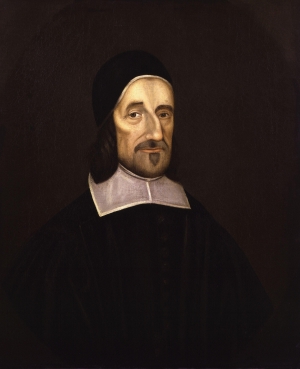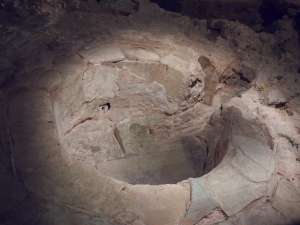It was on 18 April 1521 that Luther appeared before the powers of this world and, ostensibly, the next at at the Diet of Worms. It was there he announced publicly the formal cause of the Reformation, sola Scriptura. That doctrine says that . . . Continue reading →
History of Reformed Theology
Scott Swain On Warfield’s Revision Of The Doctrine Of The Trinity
We may shed further light on the nature of Warfield’s position by looking at the broader historical-theological context within which it emerges. Toward the conclusion of his ISBE article, Warfield offers a brief sketch of the history of Trinitarian doctrine. On his . . . Continue reading →
Lucca: Cradle Of The Reformation
It was on 18 April 1521 that Luther appeared before the powers of this world and, ostensibly, the next, at at the Diet of Worms. It was there he announced publicly the formal cause of the Reformation, sola Scriptura. That doctrine says . . . Continue reading →
Did Calvin’s Theology, Piety, and Practice Need To Be Rounded Out With Müntzer’s?
Thomas Müntzer (c. 1489–1525) was a university-trained pastor and theologian. Martin Luther recommended him to be the pastor of St Catharine’s Church in Zwickau (117 km south of Leipzig). There he came into contact with three fiery souls, Nicholas Storch (c. 1500–25), Thomas . . . Continue reading →
Beza On Sanctification (1570)
Q133 Therefore, explain fully this sanctification of ours in Christ. A133 Something is said to be sanctified which is segregated from common pollution, so that it is most pure, and wholly consecrated to God the greatest adversary of all filth. Therefore, in . . . Continue reading →
New In Print: Calvin—Subtle Sacramentarian Or Loyal Son? John Calvin’s Relationship To Martin Luther
In October of 1545, Heinrich von Wolfenbüttel (1489–1568), the Romanist Duke of Braunschweig-Lüneberg-Wolfenbüttel, in the process of a attempting to recover lands taken from him by the Protestant Schmalkald League (in 1542), was taken captive along with his sons. The Lutheran territories . . . Continue reading →
Richard Baxter On Initial And Final Justification Through Faith And Works
The magisterial Protestant churches (i.e., the Lutheran and Reformed) and their theologians did not speak of, teach, or confess a “two-stage” doctrine of justification or even a “two-stage” doctrine of salvation (justification, sanctification, and glorification). Yet, today, one sees leading evangelical and . . . Continue reading →
Turretin Contra Two-Stage Justification
VIII. Although our justification will be fully declared on the last day (our good works also being brought forward as the sign and proof its truth, Mt. 25:34–40), still falsely would anyone maintain from this a twofold gospel justification—one from faith in . . . Continue reading →
Did Ursinus Teach Final Salvation Through Faith And Works?
Zacharias Ursinus (1534–83) was the principal author of the Heidelberg Catechism (1563). He was responsible for perhaps as much as 70% of the catechism, though the two source documents that he created, from which much of the catechism was formed, drew from . . . Continue reading →
William Perkins On The Rule Of Worship And 1 Corinthians 14 Contra Good Intentions
V. Will worship, when God is worshiped with a naked and bare good intention, not warranted by the word of God. (Colossians 2:23) “Which things have indeed a shew o wisdom in will worship, and humility, and neglecting of the body; not . . . Continue reading →
Resources On Instruments In Worship
Below are gathered the quotations, posts, and essays from the Heidelblog on the history, theology, and practice of instruments in public worship. Continue reading →
Witsius: Among The Various Acts Of Faith Is Union With Christ
It seems proper, in the mean time, to remark that, amongst the various acts of faith which we are about to describe, there is one which holds the principal place, and in which, as it unites us to Christ and justifies us, . . . Continue reading →
Office Hours: Aquinas Among The Protestants
Thomas Aquinas (c.1224–74) was one of the most important Christian teachers in the period and though he was eclipsed in the centuries after, his work returned to prominence in the 16th–19th centuries particularly among Roman theologians, for whom Thomas became the theologian . . . Continue reading →
The Reformed Churches Confess Infant Baptism
Some years back I published a book review in the pages of Modern Reformation magazine. Some responded with a letter to the editor complaining that I had distinguished between the Reformed churches and the Baptist churches. My revised response is below. § . . . Continue reading →
Ursinus: The Mosaic Civil Laws Pointed To Christ And Are Fulfilled
The use of the judicial, or civil laws, was, That they might contribute to the preservation of the Mosaic polity. That they might be types of the government of the church in the kingdom of Christ, inasmuch as the princes and kings . . . Continue reading →
Are The Remonstrants Heretics?
This question comes over the transom regularly. I think most confessional Reformed pastors would probably say that, though they disagree strongly with Arminianism, it is not heresy. Somewhere I read (or heard) that William Ames (1576–1633), who served as an advisor . . . Continue reading →
The Dramatic Story Of Peter Martyr Vermigli
Pope Paul III, however, was not sitting idle in this rapidly changing climate. In 1542, after a failed attempt to conciliate Roman Catholics and Protestants at the Diet of Regensburg, he agreed on renewing the earlier practice of the Roman Inquisition under . . . Continue reading →
Two New Popular Biographies Of Zwingli
Since this is the 500th anniversary of Martin Luther’s 95 Theses (October 31, 1517) this has been understandably designated the “Luther Year.” There were, however, other figures in the Reformation, who made their own contribution. Huldrych (or Ulrich) Zwingli (1484–1531) is among . . . Continue reading →
Sola Scriptura Contra The Anabaptists In 1523–24
In his second disputation with Balthasar Hubmair, in 1523, Huldrych Zwingli well articulated the formal principle of the Reformation: “For in all controversies concerning faith and religion, the divine Scripture alone ought to be our measure and rule rather than oral tradition.” . . . Continue reading →
Muller: Sola Scriptura Was Essential To The Development Of Reformed Theology
Another precedent, already noted, was the confessional embodiment of the sola Scriptura of the Reformers. Insofar as confessional theology offered a primary basis for doctrinal development, the tendency of the Reformed confessions to begin with a doctrine of Scripture bore immediate fruit . . . Continue reading →









